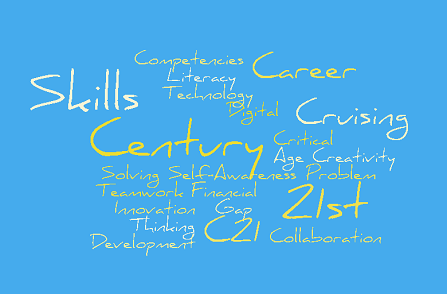By John Kershaw, President of C21 Canada and the former Deputy Minister of Education for New Brunswick.

In today’s innovation driven and competitive world, highly skilled people are the new economic and social drivers. In this context, there are two core questions facing leaders in Canada and the United States: How to nurture creative and innovative talent; and how to address the current skills gap. Along with C21 Canada, Career Cruising is poised to play an important role on both fronts.
In the knowledge and digital age value added knowledge creationdrives innovation. Thus, the demand for creative and innovative people is escalating and is emerging as one of the key elements of the global skills gap. C21 Canada is a national coalition of education and business leaders advocating for changes in Canada’s public education systems to address this reality. OurShifting Mindsvision document calls for an enhanced focus on 21st century competencies and use of modern technologies to position Canada with creative new leaders and a highly innovative workforce. The Partnership for 21st Skills is active on this same front in the United States (http://www.p21.org/).
Better understanding the complexities of the skills gap is a prerequisite to collaborative action. Despite its growing public profile, few fully understand the nature and scope of the issue. In addition to fostering the aforementioned 21stcentury competencies, other elements of the skills gap are noted below.
In his book People Without Jobs Jobs Without People Rick Miner explains how Canada’s aging demographic means fewer people available for the workforce, creating a gap in available talent for employers. Exacerbating this issue is the relatively low literacy levels of some workers, limiting their ability to upgrade their skills to stay current with changing work requirements.
A gap also exists in the field of trades, partially resulting from many parents and educators discouraging youth from pursuing this career path. Mike Rowe, a popular actor in the United States, is speaking extensively on this topic and hasfounded an organization to address the issue. Fewer entries into trades coupled with baby boomers retiring are creating a gap between supply and workforce requirements.
Similarly, too few youth are pursuing the fields of science, technology, engineering and math (STEM). Most of society’s technology innovations originate in these fields and increasing the number of STEM students is a prerequisite to any country’s future competitive position.
On October 8, 2013 the OECD will release the findings of its inaugural international survey on adult competencies. The survey will provide an unprecedented glimpse into whether the participating countries are equipping their citizens with the competencies and skills they need for success in the 21st Century.
What does this all mean? It means that what we teach, how we teachand how we assess learning,must change. It also means we must do a better job of educating people of all ages about career opportunities and how to adapt in a world where innovation is creating a complex and constantly shifting environment. C21 Canada is building awareness of the need for more relevant and engaging models of learning and Career Cruising is offering a suite of programs and services designed to better align people’s interests with existing and emerging careers. If we are successful on both fronts, instead of suffering through an ongoing skills gap we will instead create a learning and skills agenda for the 21st Century.
